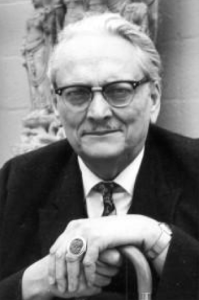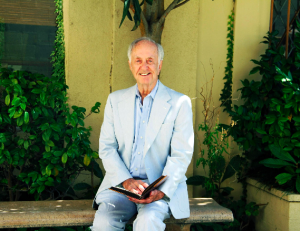The Philosophical Research Society is a nonprofit organization founded in 1934 for the purpose of providing resources for the study and research of the world’s wisdom literature. Rejecting doctrinal, political, or ecclesiastical investments, it provides a learning environment sheltered from any intention to coerce or convert. The goal of this institution is to enable the individual to develop a mature world view and philosophy of life in association with a diverse and stimulating community of inquiry, dedicated to understanding and appreciating their unique possibilities in the unfolding universal pattern.

One Word: Philosophy
At PRS, we start with a single word: Philosophy.
This one word comes from the ancient Greeks for whom phileo meant “love” and sophia meant “wisdom.”
As elementary and apparent as it may seem, this one word, this “love of wisdom,” raises two profound questions: what is love, and what is wisdom? With such inquiry, we are instantly confronted with the challenge of two great mysteries. The Greeks may have often spoken in diverse ways about the meaning of philosophy: greedy for wisdom, lusting after wisdom, pursuing wisdom as the way of personal glory… Yet much more did they insist in the loving of wisdom. In so doing, the term “love” meant giving one’s affectionate attention and unselfconscious care in the pursuit of wisdom.
Wisdom is insight into the nature of things, a fundamental acquaintance with Reality. All of the great insights of humankind left for us to study, which history has managed to preserve, are the priceless inheritance of every person. It is the clear goal of Philosophical Research Society and the University of Philosophical Research to provide global “lovers of wisdom” access to that treasure which is their birthright.
Thus this one word reveals our purpose and shapes our method. From this understanding we carefully draw our principles. They guide the administration of our organization:
● Inclusiveness — We look to include wisdom from its every source and to make it accessible to all who value it
● Non-Advocacy — We are not partisan nor do we endorse any one particular tradition or person.
● Freedom — We consider the quiet urgings of each heart to be the proper personal guide in the process of self-discovery. Each person is urged freely to compare and reference their natural knowing with the finest expressions of humanity’s deepest insights. We expect this process to create resonance which best leads each person on his or her unique path of learning and discovery.
● Quality Resources — To the greatest extent possible, we strive to have all of our resources distinguished by carefully referenced scholarship supported by direct experience and field work. We seek to continually refine and update our offerings as discoveries come to light and errors are uncovered.
● Community — Stimulating and good spirited interaction reflect the fact that we are a community of discovery, not just isolated individuals. Ours is the path of ecumenism and a journey of shared meanings. We are part of a movement toward World Culture in which all wisdom traditions and the highest expressions of our spiritual heritage are honored. We yearn for a planetary citizenship in which social justice and compassion aim toward a transformation of humankind.
● Education – PRS is dedicated to being a place for learning and for “drawing out” (as in the original sense of “educate”) the wisdom that lies within all traditions and all human beings.
Our Founder
 Manly P. Hall, the Philosophical Research Society’s first president, was a seeker and lover of wisdom, the very definition of a philosopher. He had the courage and the raw intellectual energy to look for wisdom in places most men had long since forgotten about, or never knew existed. He lived in an era when most Americans did not look toward other cultures and traditions, without looking down. Yet during such times, Manly P. Hall spoke, and wrote extensively, of the wisdom found in all ancient traditions. In an age when serious study of “other religions” was anathema to most, he found deep crosscultural threads and revealed many interconnected roots of modern religious expression. Neither Guru nor Saint, he made no claim of perfection, far from it; but his work is exceedingly rare in its grand scope, detail and synthesis. He embraced the wisdom of every tradition, and, with a fluid command of their obscure and complex contents, worked to express their unifying truths. His legacy is over 200 printed volumes, 8000 lectures, a hand picked library which is one of the finest in the field, and a Society and University that continue in his spirit of universal exploration and learning.
Manly P. Hall, the Philosophical Research Society’s first president, was a seeker and lover of wisdom, the very definition of a philosopher. He had the courage and the raw intellectual energy to look for wisdom in places most men had long since forgotten about, or never knew existed. He lived in an era when most Americans did not look toward other cultures and traditions, without looking down. Yet during such times, Manly P. Hall spoke, and wrote extensively, of the wisdom found in all ancient traditions. In an age when serious study of “other religions” was anathema to most, he found deep crosscultural threads and revealed many interconnected roots of modern religious expression. Neither Guru nor Saint, he made no claim of perfection, far from it; but his work is exceedingly rare in its grand scope, detail and synthesis. He embraced the wisdom of every tradition, and, with a fluid command of their obscure and complex contents, worked to express their unifying truths. His legacy is over 200 printed volumes, 8000 lectures, a hand picked library which is one of the finest in the field, and a Society and University that continue in his spirit of universal exploration and learning.
Our President
 The President of PRS is Obadiah S. Harris. He combines his skills as a community educator and administrator with study of the world’s wisdom traditions to continue the legacy and pursuits of the PRS into the present day. Dr. Harris received his Ph.D. in Educational Administration from the University of Michigan as a Stewart Mott Foundation Fellow. His background includes long service as Associate Professor and Director of the Center for Community Education at New Mexico State University, and as Associate Professor and Director of the Regional Center for Community Education at Arizona State University. Dr. Harris’s study and practice of the great Eastern and Western Wisdom Traditions has helped shape and direct his life.
The President of PRS is Obadiah S. Harris. He combines his skills as a community educator and administrator with study of the world’s wisdom traditions to continue the legacy and pursuits of the PRS into the present day. Dr. Harris received his Ph.D. in Educational Administration from the University of Michigan as a Stewart Mott Foundation Fellow. His background includes long service as Associate Professor and Director of the Center for Community Education at New Mexico State University, and as Associate Professor and Director of the Regional Center for Community Education at Arizona State University. Dr. Harris’s study and practice of the great Eastern and Western Wisdom Traditions has helped shape and direct his life.
See more at: http://prs.org/wpcms/#sthash.7BzoVMHD.dpuf